|
Printables |
PowerPoints |
Online exercises |
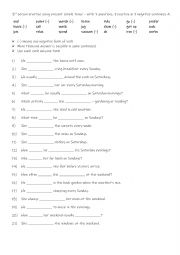
|
3rd person practise using present simple tense � with positive & negative sentences + questions 4
Students familiarise themselves with the 21 verbs. Then they read the sentences to see which question verb is required to complete the gap-fill. Each form is used 7 times! Answers on page 2.
Level: elementary
Age: 7-100
Type:
Downloads: 135
|
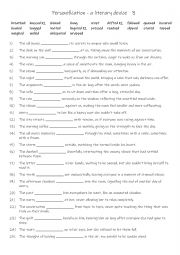
|
B2-C1 Personification - a literary device 3
Learning personification helps students bring their writing to life by giving human qualities to non-human things, making descriptions more engaging and relatable. It enhances creativity, allowing them to craft vivid imagery and evoke emotions in their readers. Understanding personification also deepens their appreciation of literature, as it is a ...
Level: advanced
Age: 13-100
Type:
Downloads: 127
|
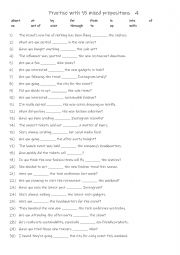
|
A1+-A2 Practise with 15 mixed prepositions 4
First, students need to familiarise themselves with the 15 prepositions and their use. Then they read the sentences to work out which preposition is needed to complete the gap-fill. Each preposition is used 2 times! Answers on page 2
Level: elementary
Age: 8-100
Type: worksheet
Downloads: 111
|
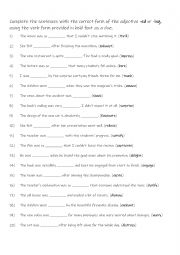
|
B1- B2 Adjective -ed or -ing practise
Students complete the sentences with the correct form of the adjective -ed or -ing, using the verb form provided in bold font as a clue. Answers on page 2.
Level: intermediate
Age: 10-100
Type:
Downloads: 116
|
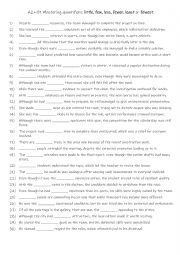
|
A2+-B1 Mastering Quantifiers Little, Few, Less, Fewer, Least, and Fewest
Learning to use little, few, less, fewer, least, and fewest correctly is essential for precise and accurate communication, especially when describing quantities. Mastering these terms allows for nuanced expression, helping to convey exact amounts or degrees more effectively. Understanding which to use with countable nouns ("fewer apples") versus un...
Level: elementary
Age: 9-100
Type:
Downloads: 105
|
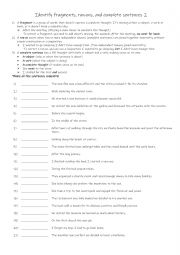
|
Identify fragments, run-ons, and complete sentences 2
First, students need to familiarise themselves with the 3 types of sentences. Then they read the sentences to work out which one is which. Each type is used 7 times! Answers on page 2
Level: intermediate
Age: 10-100
Type:
Downloads: 107
|
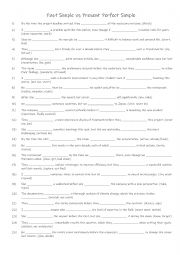
|
B1-B2 Past simple v present perfect
Understanding the difference between the past simple and present perfect tenses is important because they serve different functions in communication:accurate time reference, clarity in communication, understanding sequence and duration, expressing experience and changes, effectiveness in storytelling
& enhanced grammar proficiency. Answers on page...
Level: intermediate
Age: 10-100
Type:
Downloads: 118
|
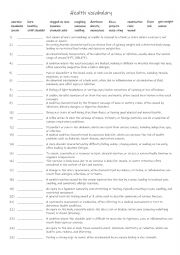
|
A2+-B1 25 Health vocabulary words
Students familiarise themselves with the 25 health related words and their meanings. Then they read the definitions and write the word being described in the space provided. Answers on page 2.
Level: elementary
Age: 8-100
Type:
Downloads: 120
|
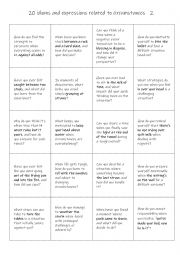
|
B1+-C1 Circumstance idioms and expressions 2
This is a speaking reinforcement activity to supplement the other worksheet I uploaded earlier this year. Students working in pairs or small groups can either ask each other the questions or answer the question themselves.
Level: intermediate
Age: 12-100
Type:
Downloads: 121
|
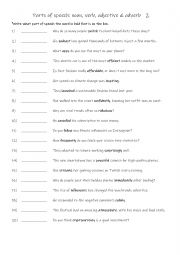
|
Parts of speech noun, verb, adjective & adverb 2
Learning parts of speech�nouns, verbs, adjectives, and adverbs�is essential because they are the foundation of English grammar. Mastering them helps students build grammatically correct sentences, communicate more effectively, expand their vocabulary, improve reading comprehension, and perform better in exams and writing tasks. Answers on page 2.
Level: elementary
Age: 8-100
Type:
Downloads: 107
|
|
|
|
|












